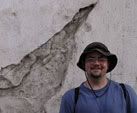Tuesday, March 29, 2005
DATELINE: Tuesday, March 29, 2005
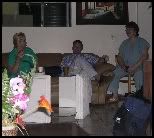 Ashley and I woke at 6:30 and quickly got dressed to meet everyone else downstairs by 7. Butch and Andrew were there already, but soon the rest of the team came down to join us.
Ashley and I woke at 6:30 and quickly got dressed to meet everyone else downstairs by 7. Butch and Andrew were there already, but soon the rest of the team came down to join us.We found that ordering breakfast was more difficult than we had anticipated. Actually, the ordering wasn’t really a major problem, as we just pointed to the continental breakfast on the menu and the waitress nodded her understanding, so even the language barrier wasn’t an issue. Getting the food in a timely fashion, however, was. I guess it’s another incident of Gringo Time expectations, but 20 minutes crawled by and we’d seen no food.
While we waited, I used the hotel’s complementary high speed internet access to jot a few notes to folks back home to let them know we’d arrived safely, albeit not without some life-threatening incidents.
It was 7:20 before we received our continental breakfast, bowls of nice fresh fruit. I think we had somehow been expecting muffins and jelly, or something similar. However, we would learn the following day that the continental breakfast changed every day, so whenever we ordered it we would get something different every time. The fruit was great stuff, but not as filling as we’d hoped to get to start us on what was to be a busy day.
Jo Ann and Sylvana arrived right on time at 7:30, with Sylvana’s van and Tito’s truck, once again piled high with all of our supplies luggage as well as a large set of metal shelves just perfect for the pharmacy. We climbed back into Sylvana’s van and then had to hold on for dear life as she zipped into San Salvador’s morning rush hour with a recklessness that Marcello would have greatly admired. We didn’t care. We didn’t even put on our seatbelts, figuring that she knew what she was doing and we were otherwise on a mission from God so we’d be fine.
My impression from the previous night that San Salvador was nearly indistinguishable from most large American cities continued to bear itself out. Mostly. In the day light, of course, we could see more of the tell-tale signs of being in a central American country, such as more guards with shotguns. However, the guards with shotguns seemed to be primarily guarding things like banks and other important structures and not so much average places like McDonalds. There were lots of people riding bicycles and motorcycles, seemingly on their way to work in this busy urban sprawl.
We had been told that our clinic site would be in a very poor neighborhood in San Salvador and that we would be setting up in a school. Being some distance away and our van being in heavy traffic, it took around a half hour to drive there. During the journey, I kept hearing a curious buzzing noise from outside the van. It didn’t sound like a sound being made by the van, though. Instead, it sounded exactly like the buzzing of cicadas—a sound I knew well from having grown up in Mississippi.
Eventually, we left the city streets and began traveling through a more residential section of town where the homes began to resemble some of those we had seen in Pasaco. Then, in the midst of the neighborhood, we came to a large new building surrounded by chain-link fencing topped with razor-wire. At first I thought this must be the school, but then we drove past it. I was told later that this building was a brand new neighborhood medical clinic. It was so new, in fact, that they were having their dedication ceremony the following day. It made me wonder what good we could do in the neighborhood if there was already such a nice looking clinic. Later, Jo Ann told us that even though the neighborhood clinic is there, completed and soon to be dedicated, they don’t actually have any doctors or medication and aren’t expected to actually open at any point in the foreseeable future. Strange. It's as if they had just enough money to build the building, but not enough to actually staff it and supply it.
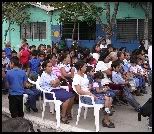 At last we arrived at our own clinic site. It was a cluster of three small brightly painted buildings that comprised the grounds of a pre-school that was located next door to a beautiful church. Outside of it were dozens of people, most of them seated in plastic patio chairs.
At last we arrived at our own clinic site. It was a cluster of three small brightly painted buildings that comprised the grounds of a pre-school that was located next door to a beautiful church. Outside of it were dozens of people, most of them seated in plastic patio chairs.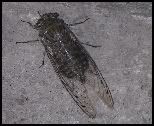 The other thing I noticed as I exited the van was the distinct buzzing of insects in the trees above—particularly in the tree directly outside the building. Yep, I had been right; they were cicadas. But not just any cicadas, no these were gigantic monster cicadas that would have terrified the wussy little Mississippi cicadas I grew up with. Their collective buzzing was practically a roar.
The other thing I noticed as I exited the van was the distinct buzzing of insects in the trees above—particularly in the tree directly outside the building. Yep, I had been right; they were cicadas. But not just any cicadas, no these were gigantic monster cicadas that would have terrified the wussy little Mississippi cicadas I grew up with. Their collective buzzing was practically a roar.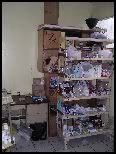 We quickly unloaded our equipment and luggage and carried it into the cluster of buildings. There were only a handful of rooms in the pre-school’s complex of small buildings, divided by an open air corridor that lead down to an equally open air common area. Mary Ann and I were directed to first doorway, which was the administrative office of the pre-school. This is where we were to set up our pharmacy. Soon our new shelves were brought in and placed inside the office. I also found a couple of small school tables which I once again stacked atop one another to create even more shelving. Mary Ann and I then began unloading and organizing the meds. Once again, this was a chaotic process, because we had not been as careful as we should have been when packing things back up at Marcello’s house following our luggage consolidation attempt. However, we were so old hat at organizing the disorganized by this point that it didn’t really bother us too much.
We quickly unloaded our equipment and luggage and carried it into the cluster of buildings. There were only a handful of rooms in the pre-school’s complex of small buildings, divided by an open air corridor that lead down to an equally open air common area. Mary Ann and I were directed to first doorway, which was the administrative office of the pre-school. This is where we were to set up our pharmacy. Soon our new shelves were brought in and placed inside the office. I also found a couple of small school tables which I once again stacked atop one another to create even more shelving. Mary Ann and I then began unloading and organizing the meds. Once again, this was a chaotic process, because we had not been as careful as we should have been when packing things back up at Marcello’s house following our luggage consolidation attempt. However, we were so old hat at organizing the disorganized by this point that it didn’t really bother us too much.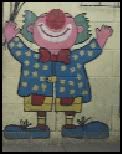 Meanwhile Ashley, Dr. Allen and Andrew set up in the large room across the corridor which they were to share. Flo, our appointed pediatrician med-student, set up in the rear building of the complex. We also got to meet many of the missionary and translator staff we would be working with during the week’s clinics. Jo Ann told us that she would be providing translation services for the pharmacy.
Meanwhile Ashley, Dr. Allen and Andrew set up in the large room across the corridor which they were to share. Flo, our appointed pediatrician med-student, set up in the rear building of the complex. We also got to meet many of the missionary and translator staff we would be working with during the week’s clinics. Jo Ann told us that she would be providing translation services for the pharmacy.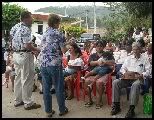 Soon it was time to go out front for introductions to our patients for the day. Even with a public address system set up, it was hard to hear over the din of the cicadas. There were only 40 patients at the beginning of the day. I believe we were prepared to give out at least 60 number tickets for the day, but the other 20 did go to use throughout the day as more patients arrived.
Soon it was time to go out front for introductions to our patients for the day. Even with a public address system set up, it was hard to hear over the din of the cicadas. There were only 40 patients at the beginning of the day. I believe we were prepared to give out at least 60 number tickets for the day, but the other 20 did go to use throughout the day as more patients arrived.After introductions, Dr. Allen shared his testimony while the rest of us returned to setting up our stations. He had shared it with at least one of the patient groups in Guatemala, but I had not been there to hear it that day because of pharmacy set up. However, because our pharmacy was there at the front of the building with open windows, I could hear it. I don’t think he would mind me sharing it here.
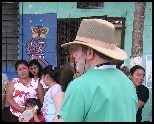 Dr. Allen took a very long road to on his way to Christianity. He spent much of his early adult life as a secular humanist. Both he and Mary Ann had been married and divorced from other people before meeting one another, marrying and starting a family. Of the two of them only Mary Ann was a Christian, but as she had been raised under a strict Catholic doctrine she was under the belief that because she had divorced she was now damned to hell. Even in the face of that, she wanted to take her children to church and began attending services in a local protestant church. She would occasionally ask Dr. Allen to go with them, but he was deadest against it and would become angry with her when she asked. He said that at one point things in their marriage had become do bad that he had threatened to divorce her if she ever asked him to church again. Somehow, though, she did manage to persuade him to go in because the minister at her church had said he wanted to meet Dr. Allen. Dr. Allen went with the full intention of telling this man off. However, instead of a fight Dr. Allen he found that he actually liked the minister and the two soon became friends. It was not long afterwards that the spirit moved in Dr. Allen’s heart and he came to recognize the need for God in his life. He accepted Christ and joined the church there and he and Mary Allen have been strong marriage partners ever since.
Dr. Allen took a very long road to on his way to Christianity. He spent much of his early adult life as a secular humanist. Both he and Mary Ann had been married and divorced from other people before meeting one another, marrying and starting a family. Of the two of them only Mary Ann was a Christian, but as she had been raised under a strict Catholic doctrine she was under the belief that because she had divorced she was now damned to hell. Even in the face of that, she wanted to take her children to church and began attending services in a local protestant church. She would occasionally ask Dr. Allen to go with them, but he was deadest against it and would become angry with her when she asked. He said that at one point things in their marriage had become do bad that he had threatened to divorce her if she ever asked him to church again. Somehow, though, she did manage to persuade him to go in because the minister at her church had said he wanted to meet Dr. Allen. Dr. Allen went with the full intention of telling this man off. However, instead of a fight Dr. Allen he found that he actually liked the minister and the two soon became friends. It was not long afterwards that the spirit moved in Dr. Allen’s heart and he came to recognize the need for God in his life. He accepted Christ and joined the church there and he and Mary Allen have been strong marriage partners ever since.Hearing his testimony blew me away, because you would never suspect to know Dr. Allen that he was anything other than a life-long Christian. Granted, I don't know him very well myself, having only met him a few weeks before this trip. But from what Ashley has told me about him, from having worked with him and Mary Ann for four months worth of rotations, he is a very caring and compassionate doctor who wears his Christianity proudly with his patients. He's not afraid to pray for them and with them in the course of his work. It's a testimate to the life-altering power of Christ's love that this man who once hated religion has come to know God so strongly.
Dr. Allen has only been on a handful of mission trips so far. I believe that when Ashley did her first medical rotation with his office, she learned of his interest in the mission field and had reccomended Word of Life's program. He liked the sound of it so much that he and Mary Ann went with them on last year’s trip and plan to continue going with WOL and other groups in the future.
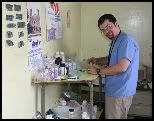 Soon our first El Salvador clinic was underway and our pharmacy almost completely set up. One thing that confused and concerned Mary Ann and I, however, was the fact that a goodly portion of our meds had seemingly vanished.
Soon our first El Salvador clinic was underway and our pharmacy almost completely set up. One thing that confused and concerned Mary Ann and I, however, was the fact that a goodly portion of our meds had seemingly vanished.See, before at our clinic in Pasaco, Guatemala, Marcello had brought us several boxes of donated Spanish-label medicines to help replenish some of our dwindling stocks. It had taken Mary Ann the better part of an hour with Dr. Allen's Epocrates equipped PDA to figure out what most of those medicines were and relabel them so that we could begin prescribing them to patients. However, by the time we’d figured them all out our final Guatemalan clinic was nearly finished, so we had just loaded them all back on the bus and taken them back to camp, intending to carry the meds on to El Salvador. From what we then deduced, though, we had managed to leave the boxes of Spanish medication back on the big school bus and they had never been unloaded with the rest of the meds we’d had at Marcello’s house. We were also missing a few other non-critical supplies, which we had to assume were left behind on the bus as well. It would have been nice to have everything we'd intended to bring, but our mistake in leaving it behind wasn't the end of the world. After all, Marcello would host other medical missions in the year and those meds would eventually go to good use.
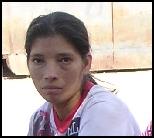 The clinic setup in the preschool in San Salvador was quite ideal to our purposes. The patients waited in the chairs out front until it was their turn to speak with the missionaries. (Unfortunately, the only shade we could give them was beneath the cicada-filled tree. As you'll see later in this day's post, this was not necessarily a good thing.) They were then invited across the street to some other small buildings the local Word of Life staff had arranged to use for the actual mission outreach.
The clinic setup in the preschool in San Salvador was quite ideal to our purposes. The patients waited in the chairs out front until it was their turn to speak with the missionaries. (Unfortunately, the only shade we could give them was beneath the cicada-filled tree. As you'll see later in this day's post, this was not necessarily a good thing.) They were then invited across the street to some other small buildings the local Word of Life staff had arranged to use for the actual mission outreach.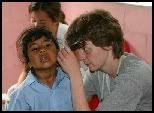 After they were finished there, the patients came back across and waited once again in front of the building until there was space for them in the open-air common area toward the back of the school. Then they would be seen be the first available doctor, depending on their needs. (For instance, if they were children, they went right to Flo’s station, while adults went to Dr. Allen, Ashley or Andrew.) We unfortunately had no dental team on this mission, but dental problems didn’t seem to come up in El Salvador nearly as much as in Guatemala.)
After they were finished there, the patients came back across and waited once again in front of the building until there was space for them in the open-air common area toward the back of the school. Then they would be seen be the first available doctor, depending on their needs. (For instance, if they were children, they went right to Flo’s station, while adults went to Dr. Allen, Ashley or Andrew.) We unfortunately had no dental team on this mission, but dental problems didn’t seem to come up in El Salvador nearly as much as in Guatemala.)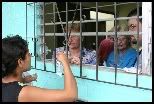 After being examined and treated, the patients brought their prescription forms around to the front window of the building where they handed them through for us to fill. Like I said, it was pretty ideal. And the weather was fantastic. We had been told by our friends in Guatemala that the weather in El Salvador was going to be even hotter than it had been during our first week. God was evidently smiling down on us that week because the temperatures rarely pushed much past 90. It was still definitely warm, but not nearly as humid as we had expected. Jo Ann stressed that the weather was abnormally cool for this time of year and that she too was rather amazed about it because they had not expected such good temperatures.
After being examined and treated, the patients brought their prescription forms around to the front window of the building where they handed them through for us to fill. Like I said, it was pretty ideal. And the weather was fantastic. We had been told by our friends in Guatemala that the weather in El Salvador was going to be even hotter than it had been during our first week. God was evidently smiling down on us that week because the temperatures rarely pushed much past 90. It was still definitely warm, but not nearly as humid as we had expected. Jo Ann stressed that the weather was abnormally cool for this time of year and that she too was rather amazed about it because they had not expected such good temperatures. While we had taken over much of the school itself, the school was still very much in operation. The kids had just been relocated to one of the larger rooms that we weren’t occupying and they mostly stayed in there, coming out to play in the play yard on occasion, usually when there weren’t too many patients around. The school’s administrator/teacher was also on hand. I think she was probably annoyed that we had taken over her office, but was very accommodating, even when she had to come in and rummage through her desk for things. Another employee was the school’s cook and she spent much of her time in the kitchen area just one room down from us, preparing some of the best-smelling foods.
While we had taken over much of the school itself, the school was still very much in operation. The kids had just been relocated to one of the larger rooms that we weren’t occupying and they mostly stayed in there, coming out to play in the play yard on occasion, usually when there weren’t too many patients around. The school’s administrator/teacher was also on hand. I think she was probably annoyed that we had taken over her office, but was very accommodating, even when she had to come in and rummage through her desk for things. Another employee was the school’s cook and she spent much of her time in the kitchen area just one room down from us, preparing some of the best-smelling foods.While I was still popping Cipros down three times a day, my stomach wasn’t quite as strong as I usually prefer. Naturally, I had to use the bano at one point and went off to find it. The banos for the school were located toward the rear of the facility behind two brown metal doors. Inside the stalls were toilets that did not come equipped with toilet seats. This made things a bit tricky, but the rooms were very clean, as were the toilets themselves and the waste baskets beside them, so I didn’t worry too much. However, when it came time to flush, I was horrified that the flush handle did nothing at all. I was afraid that I must have used the broken toilet and was embarrassed that we might have to live with my byproducts for much of the day. The school’s cook saw my distressed expression and signaled to me to pay attention. Outside the banos, there in the outdoor common area of the school, were two large concrete sinks filled with probably a dozen gallons of water each. As I watched the woman picked up one of the large plastic basins that rested on the sides of one of the sinks, dipped them into the water and pantomimed pouring it out as she pointed to the bano room I’d just come from. Ah ha! So I filled a basin, took it in there and poured it into the bowl of my toilet and everything flushed just fine.
While I’m pretty sure most of the buildings in the area did have running water, the concrete sinks and similar ones like it in the neighborhood did seem to serve as a water source for some neighborhood homes that did not have running water. Throughout the morning we saw ladies walking down the street carrying tall plastic jugs of water on their heads, coming to and from a water source further down the road. Some of the water jugs had advertising on them.
We talked with Jo Ann during some of the down time that morning. Though she’s been a resident of both South and Central America for over 20 years, she originally came from New Jersey. She had lived in Argentina and Chile for much of her time, but had spent the last several years in El Salvador helping to set up the Word of Life ministry with Tito and their son.
Jo Ann seemed impressed with how quickly and efficiently we took to our jobs. She even said my Spanish dosing instructions sounded quite authentic and asked if I spoke Spanish fluently.
“No,” I said, in perfect Spanish.
We broke for lunch around noon. We didn’t have enough staff to justify taking lunch in shifts, so we just locked up the clinic and headed to a building next door that was equipped with a large conference room. There we received our catered meal prepared by longtime friends of the Word of Life El Salvador team. We had delicious sandwiches during our lunches this week and every day these sandwiches came with some of the best potato chips I’ve ever eaten. These were home made potato chips, thick cut and deep fried to a crisp. They were fantastic, particularly with mayonnaise. And there was always extra food at the end if we wanted seconds. Beyond a few pangs of guilt about being so spoiled in a country where so many of the neighbors had so little, I enjoyed our lunch time meals. It was also a great time to get to know some of the other missionaries and translation staff members. Just as in Guatemala, most of them were university and highschool-aged students who were fluent in English.
 One non-appetizing aspect of going to and from lunch was having to walk underneath the tree in front of the building. This is because there was a near-constant stream of cicada urine raining down from the tree. Maybe it was cicada spit, but I doubt it. It was very disgusting to keep feeling drops of it hit you, knowing full well what it was. We took to walking a wide path around the tree whenever we could, but because the tree’s limbs stretched over the open corridor and play area of the pre-school complex, we could never completely avoid getting wet. We were all glad we had plenty of hand-sanitizer.
One non-appetizing aspect of going to and from lunch was having to walk underneath the tree in front of the building. This is because there was a near-constant stream of cicada urine raining down from the tree. Maybe it was cicada spit, but I doubt it. It was very disgusting to keep feeling drops of it hit you, knowing full well what it was. We took to walking a wide path around the tree whenever we could, but because the tree’s limbs stretched over the open corridor and play area of the pre-school complex, we could never completely avoid getting wet. We were all glad we had plenty of hand-sanitizer.After lunch, we returned to the clinic where we found we had far more patients waiting than we’d had before lunch. More number tickets were issued and we started right in. Fortunately, the medical team was joined then by an El Salvadorian doctor named Dr. Grace. Dr. Grace was awesome to work with, not only for her bright demeanor and quick wit but also because she spoke fluent English as well as Spanish, which made working out any prescription translation problems much easier on us. The only real downside to Dr. Grace’s presence is that because she spoke Spanish as her native language she was able to see many more patients than any of the other doctors, creating that much more work for the pharmacy. We found ourselves completely swamped in patients waiting for their prescriptions and we had to hop quick to keep up with the demand.
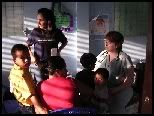 Our patients mostly consisted of partial families, with a mom bringing in her kids for treatment. Sometimes aunts would bring nieces and nephews. Sometimes grandparents would bring in grand kids. It varied quite a bit. We didn’t have a tremendous amount of male patients, but when we did they were usually elderly.
Our patients mostly consisted of partial families, with a mom bringing in her kids for treatment. Sometimes aunts would bring nieces and nephews. Sometimes grandparents would bring in grand kids. It varied quite a bit. We didn’t have a tremendous amount of male patients, but when we did they were usually elderly.One younger man we did treat was a guy we came to learn was the area’s town drunk. He was quite sloshed already when he arrived at the clinic, late in the morning after all the morning’s number tickets had been passed out. The missionaries told him to come back in the afternoon when we would give out more tickets, but the man just hung around asking anyone who got near him to have a look at his thumb. He even came up to the pharmacy on several occasions trying to get me to have a look at his thumb. Now, in his defense, I was wearing a scrub shirt, so I guess I sort of looked like a doc. (I’d avoided wearing scrubs in Guatemala for this very reason, but then I tried one on and found out the shirts are quite cool and comfy, so I wore it anyway.) I, with Jo Ann translating, told the man that I was not a doctor and invited him to come back later when a real doctor could treat him. Still he persisted and kept showing me his blackened thumbnail. Some of the locals who were in line at the pharmacy told us the man’s story and advised us to just ignore him. But after lunch, I made it a point to make sure this man got a ticket to be treated. Just because he was a little obnoxious and drunk didn’t mean he wasn’t hurting and I’d let a doctor determine just how bad off the guy’s thumb was.
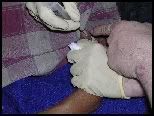 Soon he was officially in line and proceeded through the system until he came to Dr. Allen’s station. Dr. Allen said the thumbnail was filled with blood from some previous injury and it needed to be drained out. Dr. Allen had the fellow lay on one of the tables and then called Andrew over to do the surgery. Andrew proceeded to use a heated implement to bore a hole through the man’s nail and they began the drainage using a siringe. Everyone gathered around to watch and squirm at the uncomfortable sight, and I’m pretty sure Butch got video of it all. The patient never uttered a peep during it, but then again I think he was pretty-well self-anesthetized.
Soon he was officially in line and proceeded through the system until he came to Dr. Allen’s station. Dr. Allen said the thumbnail was filled with blood from some previous injury and it needed to be drained out. Dr. Allen had the fellow lay on one of the tables and then called Andrew over to do the surgery. Andrew proceeded to use a heated implement to bore a hole through the man’s nail and they began the drainage using a siringe. Everyone gathered around to watch and squirm at the uncomfortable sight, and I’m pretty sure Butch got video of it all. The patient never uttered a peep during it, but then again I think he was pretty-well self-anesthetized.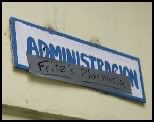 During what little down time Dr. Grace’s efficiency allowed us, I put up a new pharmacy sign. One of the real pharmacists from West Virginia who usually comes on these Word of Life missions is a guy named Fritz. He runs an establishment called Fritz’s Pharmacy back home. (And even if Ashley didn’t know the man personally, I would have known this because we get about one call per month at our house from customers of Fritz’s Pharmacy who assume that because our last name is Fritzius we must somehow be Fritz. We always explain that we are not Fritz, to which the customers almost always reply, “Well, do you know Fritz’s number?”) Unfortunately, this is the first year in the past three that Fritz was unable to come on the trip, but he did help provide us with very cheap medications to take with us. So cheap, in fact, that he bought quite a bit of them himself and wouldn’t allow us to reimburse him from funds, grants and donations that our WV team had already raised. Granted, he was getting these meds at cost, but this still represented several thousand dollars worth of pharmaceuticals that we would otherwise have been without. I dare say the vast majority of the meds we had on hand came from Fritz’s donation. In his honor, I made up two simple duct-tape signs that read “Fritz’s Pharmacia” and taped them up at our window and above our door. (I later learned that in Spanish the word is actually spelled “Farmacia” but it worked just as well.)
During what little down time Dr. Grace’s efficiency allowed us, I put up a new pharmacy sign. One of the real pharmacists from West Virginia who usually comes on these Word of Life missions is a guy named Fritz. He runs an establishment called Fritz’s Pharmacy back home. (And even if Ashley didn’t know the man personally, I would have known this because we get about one call per month at our house from customers of Fritz’s Pharmacy who assume that because our last name is Fritzius we must somehow be Fritz. We always explain that we are not Fritz, to which the customers almost always reply, “Well, do you know Fritz’s number?”) Unfortunately, this is the first year in the past three that Fritz was unable to come on the trip, but he did help provide us with very cheap medications to take with us. So cheap, in fact, that he bought quite a bit of them himself and wouldn’t allow us to reimburse him from funds, grants and donations that our WV team had already raised. Granted, he was getting these meds at cost, but this still represented several thousand dollars worth of pharmaceuticals that we would otherwise have been without. I dare say the vast majority of the meds we had on hand came from Fritz’s donation. In his honor, I made up two simple duct-tape signs that read “Fritz’s Pharmacia” and taped them up at our window and above our door. (I later learned that in Spanish the word is actually spelled “Farmacia” but it worked just as well.)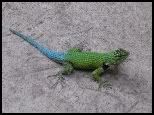
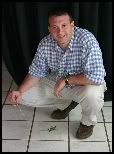 Sometime during the afternoon, Butch found a gecko. It was a bright green lizardy little thing, with patches of blue. Butch captured him in a Tupperware bowl and held him for safe-keeping and observation, tossing in a few bugs and some water to keep the little guy fed and watered. We suggested that he toss in a cicada, but we frankly weren’t sure which one would win that fight. Butch was proud of his gecko. He tied a little string leash around him and posed for pictures.
Sometime during the afternoon, Butch found a gecko. It was a bright green lizardy little thing, with patches of blue. Butch captured him in a Tupperware bowl and held him for safe-keeping and observation, tossing in a few bugs and some water to keep the little guy fed and watered. We suggested that he toss in a cicada, but we frankly weren’t sure which one would win that fight. Butch was proud of his gecko. He tied a little string leash around him and posed for pictures.Speaking of cicadas, as the afternoon progressed into early evening, the cicadas buzzing grew much louder and they began to leave the confines of the tree. Once the sun had set and we began to turn on interior lights in the clinic buildings, the cicadas took to flying in and buzzing loudly around the lights and falling on us. I didn’t care so much, as I don’t really find the cicadas themselves disgusting. However, Mary Ann was in constant fear of cicada attack and would squeal every time one would buzz through. No one wanted to squish the things, because as big as they were it would be a huge mess to have to clean up. So I wound up having to pick several of them up and fling them out the front door. The cicadas didn’t seem to care. In fact, there was a little boy at the school who went around picking up as many cicadas as he could find until he had a huge buzzing ball of them between his hands. This he carried around, causing us some concern that he might get it in his head to walk into one of the clinic rooms and fling his cicada cargo into the air. Fortunately, he didn’t.
By the end of the day, we had decided that the clinic site was so perfect that we would just do all of our week’s clinics there. Our only problem was that we were running out of some of our medications. I began compiling a list of the things we were out of or nearly out of: Children’s Benadryl, cough syrup, Amoxil liquid, Hydrocortizone cream, fungicidal creams, Triamcynalone and Nystatin cream. I hoped we could swing by a real pharmacy in the morning and pick some up. And despite our joy at having our Enfamil returned to us just days before, we had yet to use any of it. There just wasn’t a lot of need for it. It seemed an awful shame to have spent so much for it and had so much trouble getting it here and not having any use for it.
We wrapped up our day’s clinic around 7:30, let the school administrator lock up the building and then climbed into Sylvana’s van to head out. We drove 35 minutes or so back through San Salvador until we reached the Word of Life staff offices, located not terribly far from where Tito and Jo Ann’s home not to mention our hotel. The office was in a residential neighborhood and was probably used as a home itself in the past. There we, and the mission and translation staff, all gathered for our evening devotional and meal. We dined on delicious lasagna and salad provided by the same caterers from lunch. Butch had compiled a slide show of the last two days worth of pictures from Guatemala to show the El Salvador staff. I still found that my emotions were very close to the surface about some of our experiences in Guatemala. Even the pictures of the patients from our final clinic day in Pasaco not to mention all the beauty we’d seen in Antigua caused me to tear up all over again. They weren’t the heart-broken tears I’d shed after our first clinic in Guatemala, but were a good release all the same.
We said goodnight and returned to the comfort of our hotel.
In addition to wonderful air-conditioning and cool tile showers, our room also had a balcony that overlooked the street below and had a nice view of San Salvador itself. Ashley and I enjoyed standing out there and peering out in silence, marveling at where we were and what we were there to do. This was truly the kind of quick-paced trip where you had to stop and take a look around once in a while.
EL SALVADOR CLINIC DAY 1 STATS
Patients Seen: 197
Prescriptions Filled: 409
Salvations/Rededications: 75
